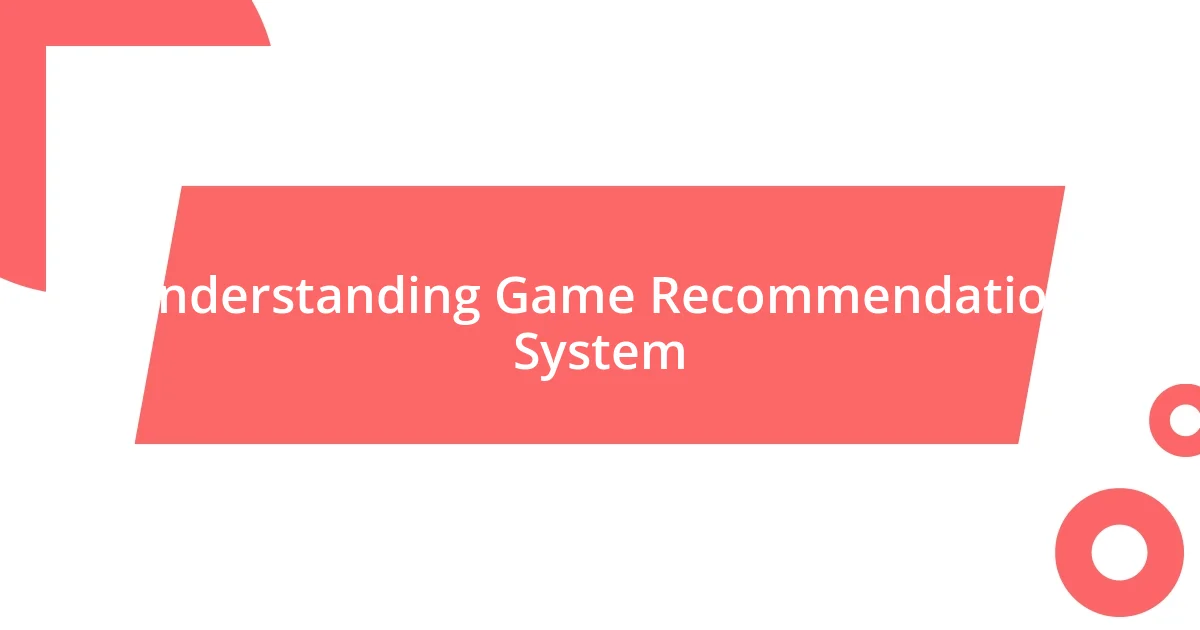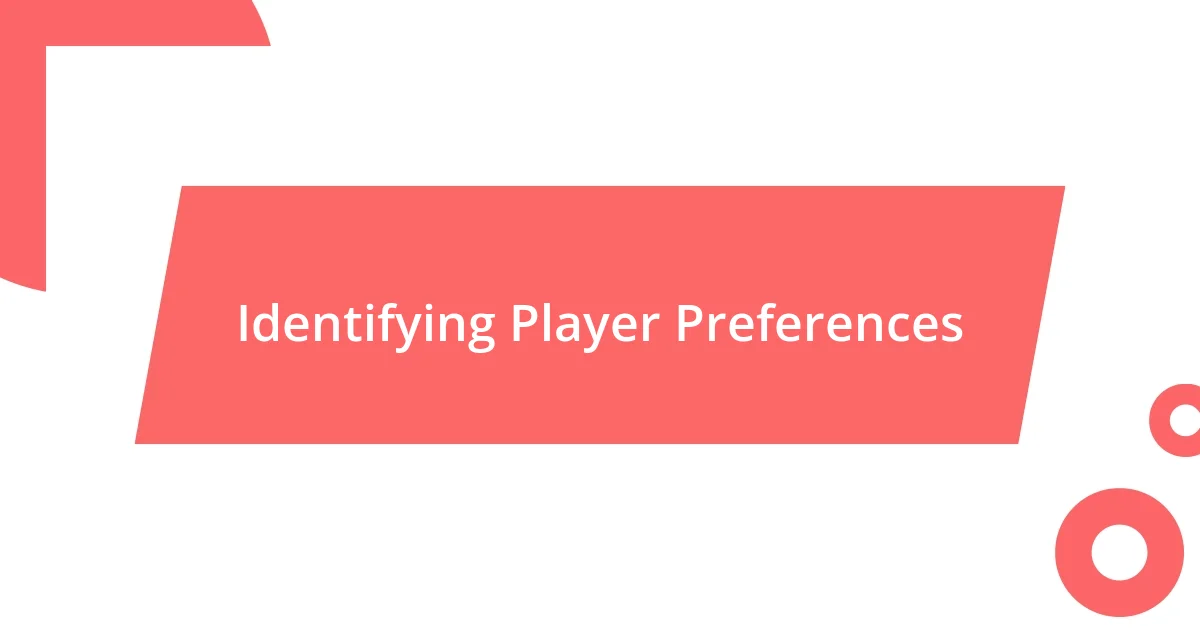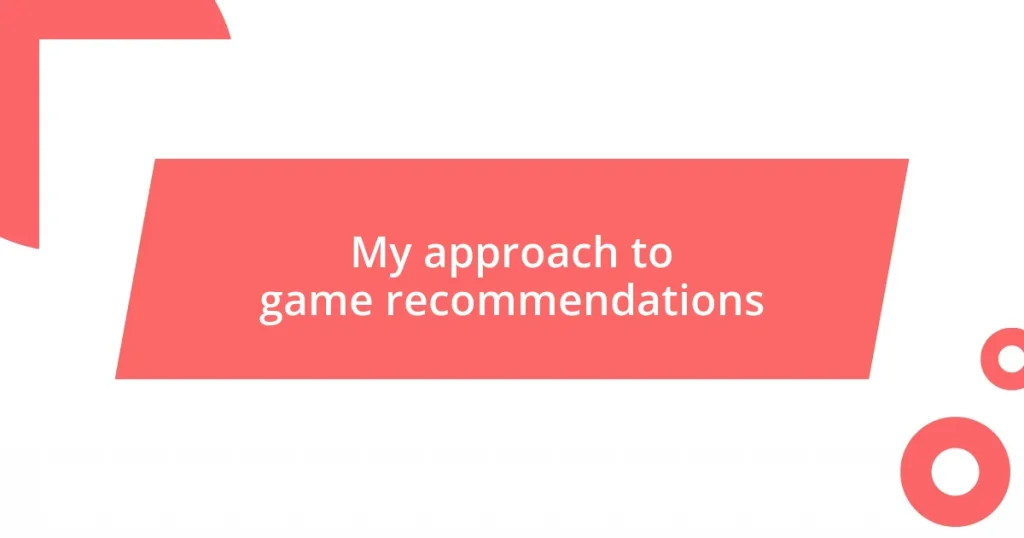Key takeaways:
- Game recommendation systems utilize techniques like collaborative filtering and content-based recommendations to align player preferences with suitable game titles.
- Understanding player preferences involves analyzing factors such as genre, gameplay style, narrative importance, and social interactions.
- Effective recommendations balance data algorithms and personal experiences, emphasizing emotional connections alongside predictive analytics for a richer gaming experience.

Understanding Game Recommendation System
A game recommendation system functions as a personalized guide in the vast world of gaming, helping players discover titles that match their preferences. I remember the first time I used a recommendation engine; it felt like receiving a tailored list of gifts just for me, opening my eyes to genres I hadn’t considered before. It made me realize how these algorithms not only analyze past behavior but also adapt to the evolving tastes of gamers.
Understanding how these systems operate is crucial, as they employ various techniques like collaborative filtering and content-based recommendations. When I explore a new game based on a friend’s suggestion, it’s fascinating to think about how the system uses our collective preferences to recommend titles that we might both enjoy. Have you ever clicked on a game you thought was perfect for you, only to be surprised by how accurate the suggestions were? That’s the magic of a well-tuned recommendation engine.
At the heart of it, these systems aim to create a more engaging gaming experience by introducing players to new possibilities. Reflecting on my own gaming journey, the recommendations often led me to hidden gems that I cherish to this day. This personal touch of algorithms really enhances the excitement of exploring new virtual worlds, doesn’t it?

Identifying Player Preferences
Identifying player preferences is a key aspect of tailoring game recommendations that truly resonate. I often think back to when I first began gaming and how my tastes evolved. Initially, I was drawn to platformers for their straightforward mechanics, but as I dived deeper into the gaming universe, I found myself captivated by story-driven RPGs. This shift was driven by my desire for narrative depth and emotional engagement, revealing how personal experiences shape our preferences.
To truly hone in on what a player enjoys, consider these factors:
- Genre Preferences: Do they lean towards action, strategy, or role-playing games?
- Gameplay Style: Are they more into competitive play or cooperative experiences?
- Story Elements: How important are narrative and character development?
- Social Aspects: Do they prefer solo gaming or engaging with friends online?
- Visual and Audio Aesthetics: What kind of art styles and soundtracks resonate with them?
By reflecting on these aspects, I find it easier to connect with a player’s unique gaming journey and recommend games they’ll likely love.

Analyzing Game Genres and Mechanics
Analyzing game genres and mechanics goes beyond simple classifications; it’s about understanding how different elements interact to create unique experiences. I often muse over my foray into strategy games. Initially, I found them daunting, with their complex mechanics and intricate planning. However, as I began to appreciate the depth and nuance in games like “Civilization,” I quickly realized that these mechanics made every victory more rewarding. Each game feels like a chess match in a fantastical realm where every decision carries weight, which ultimately reshaped my tastes.
When considering game genres, I find it insightful to analyze mechanics such as pacing and challenge. For instance, in action games, the adrenaline rush from quick reflexes can be exhilarating, while puzzle games demand a slower, more thoughtful approach. My experience playing “Portal” illustrated this contrast vividly; the game’s pace allowed me to engage my brain in a way that felt satisfying yet relaxed. The mechanics designed around problem-solving made every level a delightful brain teaser, showing the versatility of how genres can affect gameplay enjoyment.
To further encapsulate the distinctions among genres and mechanics, here’s a comparison of various types:
| Genre | Key Mechanics |
|---|---|
| Action | Fast-paced gameplay, reflex-based challenges |
| RPG | Character development, story immersion |
| Puzzle | Problem-solving, strategic thinking |
| Strategy | Resource management, tactical planning |
| Simulation | Realistic experiences, open-world exploration |
In reflecting on my gaming preferences, these genres’ distinct mechanics shape not just gameplay but emotional responses as well. How about you? Which genre speaks to you the most, and how do the mechanics resonate with your gaming style? I’d love to hear your thoughts!

Leveraging User Reviews and Ratings
User reviews and ratings play a crucial role in my game recommendation process. I remember when I was deciding whether to invest in “Horizon Zero Dawn.” The glowing user reviews reassured me about its stunning visuals and engaging gameplay. It was the collective insight from players that nudged me to give it a try, and I wasn’t disappointed. These reviews often illuminate nuances that official descriptions might gloss over, offering a window into the real player experience.
When looking at user ratings, I always focus on patterns rather than isolated opinions. For example, I’ve noticed that games with a significant divergence between critiques and player ratings can reveal deeper insights. One such instance was “No Man’s Sky,” which faced heavy criticism at launch but received positive feedback post-updates. This taught me the importance of timing; sometimes a game improves significantly after launch. Do I always trust the hype? Not necessarily—I dig deeper into what users are actually saying, seeking that balance of feedback that resonates with my own preferences.
Engaging with user reviews also allows me to connect on a more personal level with the gaming community. I find camaraderie in the shared experiences of others, whether they’re reminiscing about an emotional moment in a narrative-driven game or finding humor in a game’s glitches. This shared journey enhances my recommendations because I can align not just with metrics but with the emotional journeys that games foster. Have you ever felt moved by a game simply because someone else shared their story about it? I know I have, and it’s those moments of connection that truly enrich the gaming experience.

Incorporating Social and Community Feedback
When I think of incorporating social and community feedback into my gaming recommendations, the power of forums and social media strikes me. I vividly remember participating in a subreddit discussion about an indie game that had just released. The conversations were alive with enthusiasm, and it hit me how much insight community members could offer, often sharing experiences or strategies that reshaped my perspective on the game. Have you ever come across a hidden gem through someone else’s passion? I know I have, and it has expanded my gaming horizon immensely.
Beyond just casual conversations, I believe following community trends can guide my recommendations effectively. For example, when a game like “Among Us” exploded in popularity, I noticed how player dynamics varied dramatically based on social interactions. Observing how players shared their unique stories and playstyles significantly refined my understanding of what makes a game enjoyable, ultimately helping me suggest titles that resonate deeply with individual preferences. How can we overlook the magic that happens when players unite over their shared experiences?
Moreover, attending community events, whether online or in person, has solidified my appreciation for social feedback. I recall sitting in on a panel discussion at a gaming convention where developers shared insights on how player feedback shaped their games. The developers’ openness to evolving based on community input was not just refreshing; it made me feel more connected to the games I play. It’s these interactions that remind me that gaming isn’t just a solitary pastime; it’s a collective journey, and understanding that journey can enrich my recommendations. What experiences have you had that highlight the importance of community in gaming?

Using Data Algorithms for Suggestions
When I delve into using data algorithms for game suggestions, I often think about how these systems mimic human intuition but on an impressive scale. I remember the first time I used a recommendation algorithm on a gaming platform; it recommended “Celeste” based on my preferences for challenging platformers. The experience felt almost magical, like the platform understood my gaming soul. Have you ever been surprised by a recommendation that felt tailor-made for you? It’s fascinating how algorithms can uncover hidden gems that align perfectly with individual tastes.
While data algorithms offer impressive predictive capabilities, they rely on understanding patterns from vast amounts of player data. I recall analyzing my play history to see how well a platform could tailor suggestions based on games I’ve enjoyed. That moment I saw “Hades” pop up as a recommendation made me curious; the game had resonated deeply with many players due to its engaging story and replayability. It was a clear reminder that behind each algorithm lies a rich tapestry of player choices and experiences that continues to evolve over time.
However, I also think algorithms can miss the emotional nuances that human intuition effortlessly grasps. For instance, when I first picked up “Life is Strange,” it was a deep, personal connection to the character’s journey that pulled me in, not just the metrics surrounding its popularity. How do we ensure that the recommendations from algorithms capture the essence of why we play? It’s essential to strike a balance between the analytical and the emotional, where data-driven suggestions complement the heartfelt connections we form with games and stories.

Evaluating the Effectiveness of Recommendations
Evaluating the effectiveness of recommendations goes beyond just analyzing what’s popular; it’s about genuinely understanding player satisfaction and engagement. Reflecting on my own experiences, I remember diving into “The Witcher 3” based on a friend’s recommendation. At first, I hesitated, thinking it wouldn’t suit my taste, but the nuanced storytelling and immersive world completely changed my perception. Have you ever doubted a recommendation only to find it was spot on? The right suggestions can lead to unforgettable adventures.
To truly assess how well a game resonates with players, I often rely on personal feedback and testimonials from fellow gamers. I recall discussing “Stardew Valley” with friends who shared how it became a form of therapy amidst stressful times. Their heartfelt stories made me realize that recommendations should align with both gameplay mechanics and emotional relevance. What makes a game special isn’t merely its graphics or mechanics but the impact it has on our lives.
I also think about metrics and data when evaluating recommendations. After trying out multiple titles based on algorithmic suggestions, I became increasingly aware of the disparity between what was recommended and how I felt after playing. For instance, upon completing a game, I often jot down my thoughts and compare them against the recommendation score. This process allows me to gauge if the suggestion met my expectations. So, how do we refine our recommendations? By actively seeking not just numbers, but the heart behind each gaming experience, which is essential in enhancing the quality of our suggestions.















